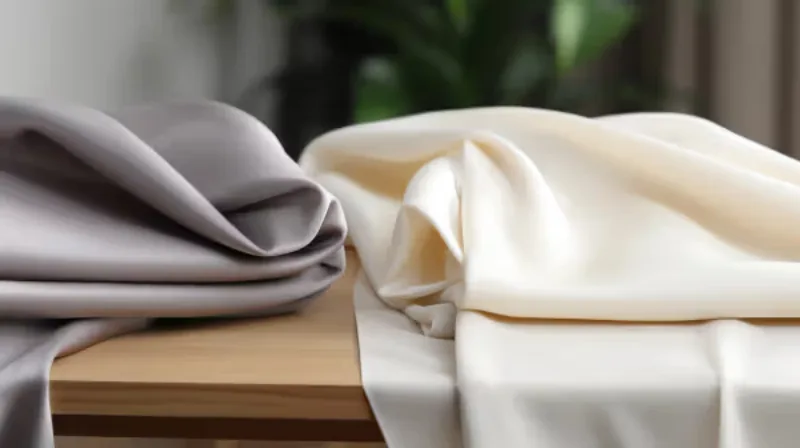
When it comes to choosing sustainable pajamas, Tencel stands out as the better option in the Tencel vs polyester debate. Tencel uses a closed-loop process that reuses water and chemicals, making its environmental impact much lower than polyester, which has a high carbon footprint and isn’t biodegradable.
You get a fabric that’s not only eco-friendly but also soft, breathable, and perfect for sleepwear. Friendtex offers you premium sustainable pajamas, so you can feel good about your comfort and the planet.
Key Takeaways
Tencel pajamas come from sustainable wood and use a closed-loop process that recycles water and chemicals, making them eco-friendly and biodegradable.
Polyester pajamas are made from petroleum, use more energy to produce, are not biodegradable, and can release harmful microplastics into the environment.
Tencel pajamas feel soft, breathable, and cool, making them ideal for sensitive skin and warm nights, while polyester pajamas are durable, wrinkle-resistant, and easy to care for.
To keep Tencel pajamas in good shape, wash them gently in cold water, avoid bleach, and air dry; polyester pajamas are easier to wash and dry but trap heat more.
Choosing Tencel pajamas supports sustainability, comfort, and a healthier planet, while polyester offers a budget-friendly and practical option with some environmental trade-offs.
Tencel vs Polyester Overview
What is Tencel?
If you want pajamas that feel soft and gentle on your skin, Tencel is a great choice. Tencel comes from natural wood pulp, usually from eucalyptus trees grown in forests that are managed responsibly. The process to make Tencel is called Lyocell, and it stands out because it uses a closed-loop system.
This means almost all water and non-toxic solvents get reused, so there’s very little waste. Tencel lyocell is biodegradable, so it breaks down naturally and doesn’t harm the planet.
You get a fabric that feels silky, breathes well, and keeps you cool at night. Friendtex uses tencel lyocell to create pajamas that are not only comfortable but also eco-friendly.
Here’s a quick look at how tencel is made:
Wood is harvested from sustainable forests.
The wood is turned into pulp.
The pulp is dissolved in a safe solvent.
The solution is spun into fibers.
The fibers are washed, dried, and woven into fabric.
This process makes tencel a top pick in the tencel vs polyester debate, especially if you care about the environment.
What is Polyester?
Polyester is a fabric you see everywhere, but it’s very different from tencel. Polyester comes from petroleum, which is a non-renewable resource. The production process uses a lot of energy and chemicals, some of which can be harmful.
Polyester is not biodegradable, so it sticks around in landfills for a long time. It can also release microfibers when you wash it, which can end up in oceans.
Even though polyester is lightweight, strong, and easy to care for, it doesn’t match tencel when it comes to being gentle on the planet. In the lyocell vs polyester comparison, tencel wins for sustainability. Friendtex offers both tencel and polyester pajamas, so you can choose what fits your needs best.
Tip: If you want pajamas that are soft, breathable, and better for the earth, tencel lyocell is a smart pick. If you need something durable and easy to wash, polyester might work for you.
Sustainable Fabric Choice

Eco-Friendly Production
When you look for sustainable pajamas, you want to know how the fabric is made. Tencel stands out as a sustainable and natural fiber because it uses a closed-loop system. This means the production process recycles over 99% of water and solvents, so almost nothing goes to waste.
The wood pulp comes from sustainably sourced wood pulp, certified by groups like FSC and PEFC. This sustainable production process keeps the environmental impact low and supports eco-friendliness.
Polyester, on the other hand, is made from petroleum. Its production uses a lot of energy and releases more greenhouse gases. Even recycled polyester, while better than new polyester, still comes from plastic and is not biodegradable.
Chemical recycling of polyester can also harm the environment and expose workers to toxins. Bio-based polyester uses plants, but it is not always biodegradable and can have a negative effect on the environment.
Friendtex takes sustainability seriously. The company holds many sustainability certifications, including GOTS, OEKO-TEX Standard 100, and other sustainable fashion certifications. These show that Friendtex pajamas meet high standards for being environmentally friendly and safe for your skin.
Note: Tencel fabrics from Friendtex carry more sustainability certifications than polyester, making them a top choice for eco-conscious buyers.
Certification Name | Related Fabric(s) | Description |
|---|---|---|
Forest Stewardship Council (FSC) | Tencel | Ensures raw materials come from ethically managed forests. |
PEFC | Tencel | Certifies sustainable forest management practices. |
OEKO-TEX Standard 100 | Tencel | Certifies textiles free from harmful substances. |
GOTS | Tencel | Limits hazardous dyes and chemicals in textile production. |
No specific certifications listed | Polyester | Polyester lacks explicit environmental certifications. |
Impact on the Environment
Tencel lyocell is biodegradable and compostable. Scientific studies show that Tencel lyocell breaks down in less than two months in water or soil. Polyester, including recycled polyester, does not break down and can last for hundreds of years.
When you wash polyester pajamas, millions of microplastics enter the environment. These microfibers harm marine life and can even end up in the food you eat.
Tencel’s eco-friendliness goes beyond being biodegradable. It uses less energy than polyester—about one-third as much. Both fabrics use similar amounts of water, but Tencel’s closed-loop system means almost no waste. Polyester’s high energy use and microplastic pollution give it a much higher environmental impact.
If you want pajamas that are sustainable, biodegradable, and gentle on the environment, Tencel lyocell is the clear winner. Friendtex’s commitment to sustainable fashion certifications and environmentally friendly practices makes it easy for you to choose sleepwear that supports a healthier planet.
Comfort and Breathability

Tencel Pajamas by Friendtex
When you slip into tencel pajamas from Friendtex, you notice the difference right away. The fabric feels silky and cool to the touch. Tencel comes from plant fibers, like eucalyptus, which gives it a natural softness that feels gentle on your skin. You get pajamas that are truly skin-friendly, perfect if you have sensitive skin or just want extra comfort at night.
Tencel stands out for its breathability. The fibers let air flow easily, so you stay cool even when the weather gets warm. Tencel pajamas also wick away moisture quickly.
If you sweat during sleep, tencel helps keep you dry and comfortable. This makes tencel a great choice for all seasons, especially in humid climates. You can count on tencel to regulate your body temperature, so you never feel too hot or too cold.
Friendtex designs tencel pajamas with your comfort in mind. The fabric drapes smoothly and doesn’t cling, which means you can move freely. The hypoallergenic nature of tencel adds another layer of skin-friendly protection. You wake up feeling refreshed, not sticky or overheated.
Polyester Pajamas by Friendtex
Polyester pajamas from Friendtex offer a different kind of comfort. Polyester feels soft and lightweight, and it’s known for being durable. You might like polyester if you want pajamas that hold their shape and resist wrinkles. Polyester also has moisture-wicking abilities, so it can pull sweat away from your skin.
However, polyester does not match tencel when it comes to breathability. The fabric tends to trap heat, which can make you feel warm during the night. If you live in a cooler climate or want pajamas that are easy to care for, polyester could work well for you.
Friendtex uses high-quality polyester to make sure the pajamas stay soft and skin-friendly, even after many washes.
If you want pajamas that are skin-friendly, breathable, and help regulate your temperature, tencel is the better pick. Polyester offers durability and easy maintenance, but tencel leads in comfort and breathability for a restful night’s sleep.
Care and Durability
Washing and Maintenance
Taking care of your pajamas helps them last longer and keeps them looking fresh. Tencel pajamas need a bit of extra love, but it’s easy once you know how. Here’s how you can keep your Tencel sleepwear in top shape:
Use gentle, plant-based detergents. Skip bleach, optical brighteners, and fabric softeners to protect the fibers.
Wash in cold water (below 86°F/30°C) on a gentle cycle or hand wash. This keeps the fabric soft and prevents shrinkage.
Turn your pajamas inside out and use a mesh laundry bag. This reduces friction and helps avoid fiber damage.
Air dry your pajamas. Gently press out water without wringing, then lay flat or hang on padded hangers in the shade. This keeps colors bright and fibers strong.
If you need to use a dryer, choose the lowest heat setting and remove your pajamas while they’re still slightly damp.
For stains, act fast. Blot with cold water and use a mild detergent solution. Avoid rubbing, which can damage the fabric.
Iron on the lowest heat setting, preferably inside out with a damp cloth, or use a steamer for wrinkles.
Store your pajamas clean and dry. Fold stretchy items gently or hang non-stretch items on padded hangers.
Polyester pajamas are easy to care for. You can machine wash them in cold water and tumble dry on low. They resist wrinkles, so you don’t need to iron them often. Just avoid high heat to keep them looking their best.
Tip: Washing less often and using eco-friendly products not only helps your pajamas last longer but also benefits the environment.
Longevity
You want pajamas that stay soft, keep their color, and look great wash after wash. Here’s how Tencel and polyester compare:
Property | Tencel (Lyocell) | Polyester |
|---|---|---|
Resistance to Pilling | Naturally resists pilling; stays smooth | May pill over time |
Shrinking | Stable if washed cold and air-dried | Can shrink with high heat |
Color Fading | Holds vibrant color; resists fading | Colors may fade faster |
Tencel pajamas keep their shape and color, even after many washes. The fabric’s smooth surface helps prevent pilling, so your pajamas always look and feel luxurious.
Polyester pajamas are durable and resist wrinkles, making them a practical choice for everyday wear. Both fabrics can last a long time with the right care, so you get great value and comfort night after night.
Tencel vs Polyester: Which is Better?
For Sustainable Pajamas
If you want the most sustainable pajamas, you should look closely at the tencel vs polyester comparison. Tencel pajamas stand out for their eco-friendly production and certifications. When you choose tencel, you get a fabric made from wood pulp, often from eucalyptus trees grown in certified sustainable forests.
The manufacturing process uses a closed-loop system, which means almost all water and chemicals get reused. This keeps waste low and protects the environment.
You might notice labels like OEKO-TEX or Lenzing’s TENCEL™ certification on tencel pajamas. These show that the fabric is free from harmful substances and comes from responsible sources. Friendtex’s tencel lyocell pajamas meet these high standards, so you can feel confident about your choice.
Polyester pajamas, even those made from recycled materials, do not break down naturally. Polyester comes from petroleum, which is a non-renewable resource.
The production process uses a lot of energy and can release microplastics into the environment. While recycled polyester is a step in the right direction, it still cannot match tencel’s low impact and biodegradability.
Here’s a quick table to help you compare:
Feature | Tencel Pajamas | Polyester Pajamas |
|---|---|---|
Source | Sustainable wood pulp | Petroleum (synthetic) |
Production Process | Closed-loop, low waste | Energy-intensive |
Biodegradability | Yes | No |
Certifications | OEKO-TEX, GOTS, TENCEL™ | OEKO-TEX, GRS (for recycled only) |
Environmental Impact | Low | High |
If you care about the planet, tencel pajamas are the better pick for sustainable sleepwear. You support ethical sourcing, chemical safety, and a smaller environmental footprint.
For Everyday Comfort
When you think about comfort, the tencel vs polyester debate gets interesting. Tencel pajamas feel silky, soft, and cool against your skin. The natural fibers let your skin breathe, which helps you stay comfortable all night.
Tencel is also hypoallergenic, so it works well if you have sensitive skin or allergies. You’ll notice that tencel pajamas wick away moisture, keeping you dry and fresh. This makes them perfect for warm nights or if you tend to sweat while you sleep.
Polyester pajamas offer a different kind of comfort. They feel lightweight and smooth, and they hold their shape well. Polyester is known for being durable and easy to care for. You can toss them in the wash, and they come out looking good with little effort. If you want pajamas that resist wrinkles and dry quickly, polyester is a solid choice.
However, polyester does not match tencel when it comes to breathability. Polyester can trap heat, which might make you feel warm or sweaty, especially in hot weather. Tencel’s natural temperature regulation gives you a cooler, more comfortable sleep.
Let’s break it down with a quick list:
Tencel pajamas:
Silky, soft, and gentle on skin
Excellent breathability and moisture management
Hypoallergenic and ideal for sensitive skin
Great for all seasons, especially warm nights
Polyester pajamas:
Lightweight and durable
Wrinkle-resistant and easy to wash
Holds color and shape after many washes
Can feel warm and less breathable
Tip: If you want pajamas that feel luxurious and keep you cool, tencel is the way to go. If you need something tough and low-maintenance, polyester works well.
You might wonder about the cost. Polyester pajamas usually cost less upfront and last a long time. Tencel pajamas cost more at first, but you may need fewer pairs because they stay fresh and comfortable longer.
Many people find that investing in high-quality tencel sleepwear saves money over time, especially if you want to buy less and choose better.
Experts in sleepwear and sportswear often recommend natural, breathable fabrics like tencel, modal, or organic cotton for pajamas. These fabrics help regulate your temperature and feel soft against your skin.
While polyester is popular in sportswear for its durability, it does not offer the same comfort or sustainability as tencel.
If you want the best fabric for activewear or sportswear, you might see polyester used often because it is strong and dries quickly. But for sleepwear, tencel lyocell gives you the softness, breathability, and eco-friendly benefits you want.
So, which is better? For sustainable pajamas and everyday comfort, tencel leads the way. Polyester is practical and budget-friendly, but tencel gives you a better sleep experience and helps protect the planet.
Pros and Cons of Pajamas
Tencel Pros and Cons
When you look for pajamas that feel soft and gentle, Tencel stands out. You get a fabric that feels silky smooth, often softer than cotton or other materials. Tencel pajamas breathe well, letting air flow and keeping you cool.
If you sweat at night, Tencel absorbs moisture quickly and helps keep your skin dry. This moisture management also reduces odor and bacteria, which is a big plus for anyone with sensitive skin.
You might love that Tencel is hypoallergenic. It rarely causes irritation, so it works well if you have allergies or skin issues. Tencel also helps regulate your body temperature, so you stay comfortable in any season. The fabric resists wrinkles and needs less ironing, making care simple.
Tencel’s closed-loop production uses less water and recycles almost all solvents, which is great for the environment. You can feel good knowing your pajamas are biodegradable and not part of the fast fashion waste problem.
However, Tencel pajamas cost more than basic options like cotton or polyester. You need to wash them in cold water and avoid high heat, or the fabric can lose its softness. Oil stains show up easily, so you should treat them quickly. If you leave Tencel pajamas crumpled, they can crease, but a quick steam or light iron fixes that.
Tip: If you want pajamas that are soft, breathable, and eco-friendly, Tencel is a smart choice—even if you pay a bit more.
Polyester Pros and Cons
Polyester pajamas offer a different set of benefits. You get strong, durable sleepwear that resists stretching, shrinking, and mildew. Polyester keeps its shape and color, even after many washes.
If you travel or need pajamas for sportswear or fast fashion, polyester works well because it dries quickly and resists wrinkles. You can find polyester pajamas in many colors and patterns, and they blend easily with other fibers for added flexibility.
Here’s a quick look at the pros and cons:
Aspect | Pros | Cons |
|---|---|---|
Durability | Long-lasting, resists wear and tear | N/A |
Care | Easy to wash, dries fast, low maintenance | N/A |
Comfort | Lightweight, soft, good for cool rooms | Less breathable, traps heat and moisture, less comfy in warm weather |
Customization | Many colors, blends, and styles | N/A |
Environmental | N/A | Petroleum-based, non-biodegradable, sheds microplastics, high environmental impact |
Skin Sensitivity | N/A | May irritate sensitive skin |
Fast Fashion | Popular for affordable, trendy sleepwear | Contributes to fast fashion waste and environmental problems |
Recycled Polyester | Available, reduces some waste | Still not biodegradable, still sheds microplastics |
Sportswear | Great for activewear and sports pajamas | Not ideal for hot sleepers or those who want eco-friendly options |
Polyester pajamas are practical and budget-friendly, but they don’t match Tencel for breathability or environmental benefits. If you want pajamas for sportswear or fast fashion, or you need something easy to care for, polyester is a solid pick. If you care about sustainability, Tencel or recycled polyester may suit you better.
How to Choose Eco-Friendly Pajamas?
What to Look For
When you want to make eco-conscious choices for your sleepwear, start by checking the fabric. Look for pajamas made from sustainable materials like Tencel, organic cotton, hemp, linen, or silk. These fabrics feel soft, breathe well, and support a sustainable lifestyle.
You should avoid synthetic options like polyester, nylon, and rayon, since they are not biodegradable and often use harsh chemicals.
Next, check for trusted certifications. These labels help you spot truly sustainable pajamas:
Certification | What It Means |
|---|---|
GOTS | Pajamas use at least 95% organic fibers and avoid harmful chemicals |
OEKO-TEX® STANDARD 100 | Every part of the pajamas is tested for harmful substances |
Fair Trade Certified™ | Workers get fair wages and safe conditions |
Bluesign® | The production process avoids dangerous chemicals and saves resources |
USDA Organic | Raw materials are grown without synthetic pesticides or fertilizers |
You also want to choose brands that care about the planet. Look for companies that use eco-friendly packaging, practice ethical labor, and focus on water-saving production. Friendtex, for example, offers sustainable pajamas with several certifications, so you know you’re making eco-conscious choices.
Simple Tips
You don’t need to be an expert to pick sustainable pajamas. Here are some easy ways to make better choices:
Pick natural, breathable fabrics like Tencel, organic cotton, or hemp.
Always check for certifications on the label.
Choose simple designs without extra decorations that can irritate your skin.
Go for light colors and loose fits for comfort and less heat retention.
Buy fewer, high-quality pajamas that last longer and reduce waste.
Wash your pajamas gently with plant-based detergents and air dry when possible.
Support brands that value sustainability and ethical practices.
Tip: When you choose sustainable sleepwear, you help the planet and enjoy better comfort. Every small step counts toward a more sustainable lifestyle.
Making eco-conscious choices in your pajamas is easy when you know what to look for. You get comfort, style, and peace of mind knowing you’re supporting a sustainable future.
Conclusion
When you want truly sustainable pajamas, Tencel stands out. Its closed-loop process, biodegradable fibers, and low impact on the environment make it the top sustainable choice. Check out this quick comparison:
Environmental Aspect | Tencel Pajamas | Polyester Pajamas |
|---|---|---|
Raw Material | Sustainable wood | Petroleum-based |
Biodegradability | Yes | No |
You can trust Friendtex for sustainable, high-quality sleepwear. Here’s a simple checklist for choosing sustainable pajamas:
Pick natural, sustainable fabrics like Tencel.
Look for trusted certifications.
Ask about closed-loop processing.
Choose brands with clear sustainability practices.
Make sure your pajamas feel soft and comfortable.
Every sustainable choice you make helps the planet and your comfort. You’ve got this!
FAQ
What makes Tencel pajamas more sustainable than polyester?
Tencel pajamas use wood pulp from responsibly managed forests. The closed-loop process recycles water and solvents. Polyester comes from petroleum and does not break down. If you want eco-friendly sleepwear, Tencel is the better choice.
Are Tencel pajamas good for sensitive skin?
Yes! Tencel feels soft and smooth. The fabric is hypoallergenic and gentle. If you have sensitive skin or allergies, you’ll love how Tencel pajamas keep you comfortable all night.
How do I wash and care for Tencel pajamas?
Wash your Tencel pajamas in cold water on a gentle cycle. Use mild detergent. Air dry or tumble dry on low. Avoid bleach and high heat. This keeps your pajamas soft and looking new.
Do polyester pajamas last longer than Tencel pajamas?
Polyester pajamas resist wrinkles and hold their shape well. Tencel pajamas also last a long time if you care for them properly. Both fabrics offer great durability, so you get value from either choice.
Can I customize Friendtex pajamas for my brand?
Absolutely! Friendtex lets you choose styles, colors, and patterns. You can add your logo or special details. This way, you get pajamas that match your brand’s vision and stand out in the market.


